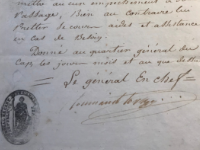In the 1790s, self-liberated slaves in Haiti fought for their independence from French colonial rule. While the Haitian people ultimately won their independence, hundreds of slaveholders fled from Santo Domingo to Philadelphia during the conflict, bringing their slaves with them and perpetuating their captivity.
Under the guidance of historian Scott Heerman, you’ll use historical maps and documents to rethink what it meant to be enslaved during this time and reexamine what it meant to be an abolitionist.
About the Speaker
Scott Heerman is a history professor at the University of Miami whose research focuses on slavery and emancipation in the U.S. and Atlantic World. Heerman earned his Ph.D. from the University of Maryland and was previously the Patrick Henry Postdoctoral Fellow in the history department at Johns Hopkins University. Heerman was an NEH fellow at the Library Company of Philadelphia in Fall 2018, during which time he drew heavily from the Pennsylvania Abolitionist Society records held at HSP in his research.
Heerman’s first book, The Alchemy of Slavery: Human Bondage and Emancipation in the Illinois Country, was published in 2018 by the University of Pennsylvania Press. It traces long and violent processes of emancipation in the Illinois Country that spanned the eighteenth and nineteenth centuries. Heerman is also in the preliminary stages of a second book project, provisionally entitled Carried Back: Black Kidnapping in the Age of Atlantic Emancipation, which looks at black kidnapping in the hemispheric Caribbean from the Age of Revolutions through the era of emancipation.
Heerman has received grants and fellowships from the Huntington Library, the William Clements Library, the Newberry Library, the Abraham Lincoln Library, the Filson Historical Society, the Council on Library and Information Resources, and the American Historical Association. His articles have appeared or are forthcoming in Slavery and Abolition, Early American Studies, the Journal of the Early Republic, and the Journal of Illinois History.

